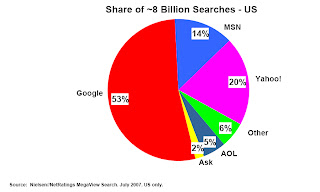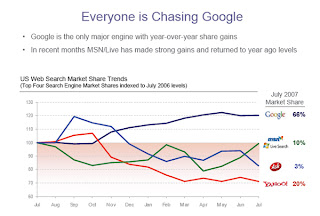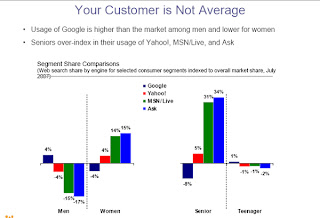Day 1
9-10:30 am
The Search Landscape – answered questions like: what are searching trends online? Who’s buying, who’s not? What are the main search engines right now and the best places to find your online market?
There were 4 speakers and the moderator was Andrew Goodman, Page Zero Media
Bill Tancer, Hitwise
Jon Stewart, Nielsen/NetRatings
Jeremy Crane, Compete
James Lamberti, comScore Networks
The first speaker, Bill Tancer, advised Google is growing at a rate of 24.3% compared to August of 2005. The top 3 searches account for 80% of all visits to sites in a category. Google is #1, Yahoo is #2, MSN is #3, Ask is #4. Did you know that 10% of Google searches are through utube? Looks like its time to start optimizing some video 🙂
We also found that people still prefer spiders, the human powered searches are NOT even in the top 50 search engines… so don’t worry about those taking over the world even if you do read press about it.
What IS taking over the Internet world, however, are social networking sites. MySpace and Facebook are huge, and its important to have a presence on these sites and figure out a way to drive traffic through them. Its interesting to see the way search has evolved even with people’s homepages. They used to be a search, then they evolved to a news or B2B sites like CNN, etc…. NOW they are actually social networks. Why do you care? Because if you factor in the searches in MySpace and Ebay, they would actually be BIGGER search engines than Ask or MSN. Obviously social networking is here to stay… so go get your myspace, linked in, and facebook page pronto!
The next speaker Jon Stewart advised us how the searcher acts when it comes to buying. He stated that 67% of BUYS that happen online occur when the individual types in the direct URL into the address bar. So stop thinking that people are going to find your site on a search engine and buy from you that day. The consumer is smarter than that, and they expect to build a relationship with you before they buy. Once they trust you its an easy sale though, over half go directly to you when they want something 🙂
Jon had a very interesting case study of slides from Neiman Marcus, Bed bath and Beyond, and Amazon telling where their business comes from. Of course, over 50% for all companies was Google, because Google has market share on the 8 billion searches done in the US monthly:

I guess Jon’s main point was that you need to be exposed in a variety of places and locations using online branding, banner ads, etc. because you need to build the consumer’s trust in you before they buy. Its still important to be in the search engines so consumers find you in the beginning of their search experience, but remember when they finally decide to buy from you, it will be after multiple visits and impressions in various different arenas. This is why you need analytics!!!
Also speaking this morning was Jeremy Crane, who had some very interesting statistics about demographic search. Did you know that every month in the US there are 6.5 BILLION searches? Everyone searches differently. It was interesting to see his “everyone’s chasing google” slide and notice that Google is growing in searches but the other engines are pretty much static or sinking.
 Then he took it a step further and said what demographics preferred what engine. I found this very funny. Men prefer google, women prefer Ask and Yahoo. Maybe its like asking for directions, you guys are still simple and want the google straight answer. Women, on the other hand, want a bunch of opinions and perspectives like Ask and Yahoo provide.
Then he took it a step further and said what demographics preferred what engine. I found this very funny. Men prefer google, women prefer Ask and Yahoo. Maybe its like asking for directions, you guys are still simple and want the google straight answer. Women, on the other hand, want a bunch of opinions and perspectives like Ask and Yahoo provide.

James Lamberti with comScore had a nice perspective which advised you to really target your market by considering Audience, Actions, Impact and Location. People actually act and react differently if they are at work or at home, searching on a weekday or on a weekend. Getting data for the above factors is difficult, a couple paid subscription sites were mentioned: http://www.compete.com/ or http://www.comscore.com/. In a nutshell, the more you know about your users, the better luck you will have converting them.
This @home vs @work scenario makes me think of Marco & Yvonne, and the SitePal debate they are having. Yvonne’s worried that girls searching for Orange County limos at work are going to click off her site when the SitePal speaks. What would YOU do? And don’t rip me for their iframes either, we advised against it.



